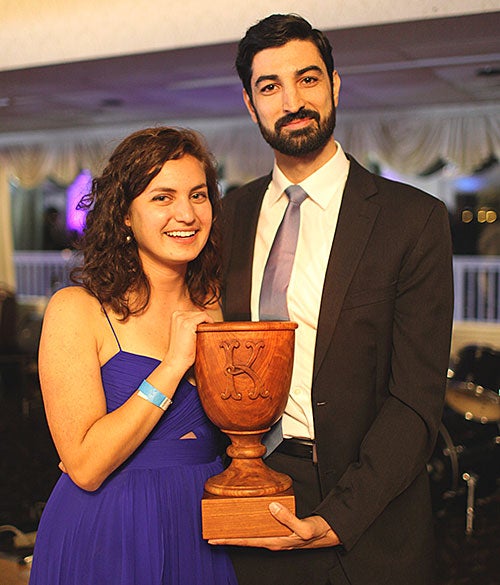Note: Yale School of the Environment (YSE) was formerly known as the Yale School of Forestry & Environmental Studies (F&ES). News articles and events posted prior to July 1, 2020 refer to the School's name at that time.

The F&ES community last week awarded the 2016 Kroon Cup to two graduating Master’s students, one who has helped transform Kroon Hall’s northern courtyard into a forest garden, and one whose sustainability work inside the School’s flagship home has earned him the nickname “Mr. Kroon.”
The winners were Emma Akrawi ’16 M.E.M. ’14 B.A., a fifth-year Master's student who made the redesign of the Kroon courtyard her independent study over the past year, and James Ball ’16 M.E.M., a green building expert who led a two-year multi-disciplinary research project on Kroon’s energy performance.
Awarded each spring, the Kroon Cup recognizes individuals who embody stewardship and implement projects that engage and inspire the larger F&ES community. The winner is selected by a vote by the school’s students, staff, and faculty.
Akrawi has worked all year to create a beautiful and ecologically thoughtful garden in the space between Kroon and Sage Halls. The project, known as the North Courtyard Edible Forest Garden, required coordination with the Science Hill Landscaping Committee and a range of Yale officials, as well as promotion within the School, volunteer recruitment and oversight, and site design and planting.
“I am touched by all my peers, faculty, and staff in the F&ES and greater Yale community who have embraced this project — and entertained countless meetings with me,” she said. “Building this garden has been more than a metaphor for growing community — it’s been a chance to learn from and collaborate with dozens of people across the University.”
Ball, who last month was honored by the Yale Office of Sustainability for his commitment to sustainability on campus, spent two years assessing the energy performance of Kroon and served on both the School’s Environmental Stewardship Committee and the Built Environment student interest group. He also contributed to the School’s green building curriculum.
“The central thesis of my work on Kroon Hall is that managing an environmentally sustainable building is impossible without understanding and involving the community of people that use the building,” he said. “Receiving the Kroon Cup is a testament to the community’s support of the ongoing effort to sustainably manage the School of Forestry and Environmental Studies' buildings. I have learned a lot from my small contribution to this ongoing effort and am grateful to have worked closely with such a talented and passionate community.”
During the past year, Bell also served as project lead for the F&ES Carbon Challenge, which utilizes the university as a living laboratory for applied research and aims to inform energy policy, climate change mitigation, and environmental economics by testing multiple models of carbon pricing.
“It is an honor to share this award with James, who not only championed the Kroon Carbon Challenge,” Akrawi said, “but was a crucial partner in helping me survey the needs of the F&ES community.”
Akrawi and Ball received the award during the School’s year-end celebration at Amarante’s Sea Cliff in New Haven.
The winners were Emma Akrawi ’16 M.E.M. ’14 B.A., a fifth-year Master's student who made the redesign of the Kroon courtyard her independent study over the past year, and James Ball ’16 M.E.M., a green building expert who led a two-year multi-disciplinary research project on Kroon’s energy performance.
Awarded each spring, the Kroon Cup recognizes individuals who embody stewardship and implement projects that engage and inspire the larger F&ES community. The winner is selected by a vote by the school’s students, staff, and faculty.
Akrawi has worked all year to create a beautiful and ecologically thoughtful garden in the space between Kroon and Sage Halls. The project, known as the North Courtyard Edible Forest Garden, required coordination with the Science Hill Landscaping Committee and a range of Yale officials, as well as promotion within the School, volunteer recruitment and oversight, and site design and planting.
“I am touched by all my peers, faculty, and staff in the F&ES and greater Yale community who have embraced this project — and entertained countless meetings with me,” she said. “Building this garden has been more than a metaphor for growing community — it’s been a chance to learn from and collaborate with dozens of people across the University.”
Ball, who last month was honored by the Yale Office of Sustainability for his commitment to sustainability on campus, spent two years assessing the energy performance of Kroon and served on both the School’s Environmental Stewardship Committee and the Built Environment student interest group. He also contributed to the School’s green building curriculum.
“The central thesis of my work on Kroon Hall is that managing an environmentally sustainable building is impossible without understanding and involving the community of people that use the building,” he said. “Receiving the Kroon Cup is a testament to the community’s support of the ongoing effort to sustainably manage the School of Forestry and Environmental Studies' buildings. I have learned a lot from my small contribution to this ongoing effort and am grateful to have worked closely with such a talented and passionate community.”
During the past year, Bell also served as project lead for the F&ES Carbon Challenge, which utilizes the university as a living laboratory for applied research and aims to inform energy policy, climate change mitigation, and environmental economics by testing multiple models of carbon pricing.
“It is an honor to share this award with James, who not only championed the Kroon Carbon Challenge,” Akrawi said, “but was a crucial partner in helping me survey the needs of the F&ES community.”
Akrawi and Ball received the award during the School’s year-end celebration at Amarante’s Sea Cliff in New Haven.
Published
May 6, 2016